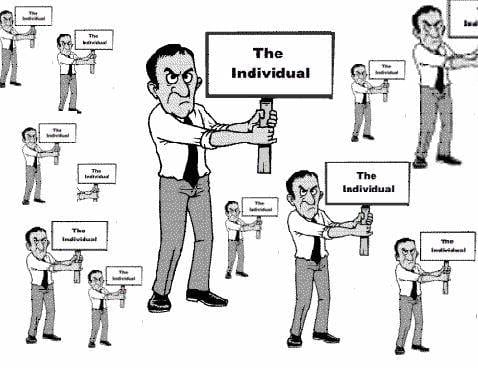Individualism is a key value in American white culture.
By “individualism,” I don’t merely refer to the idea of individuality or that individuals have value. The latter are Christian notions rooted in God’s creating humanity in his image. “Individualism,” as I’m speaking of it, goes further.

What is “Individualism”?
It includes the belief in the sovereignty of the individual. For some, this implies that the needs or wants of the individual have priority over the collective group. For others, individualism entails a claim to autonomy.
Professor of Philosophy John Kavanaugh explains the “moral challenge” of this “radical narcissism.” He says autonomous individualism is
… the condition when human judgment cannot see beyond its own exercise of freedom and exercises that freedom in isolation from the other.
Two hidden dangers in that wonderful gift of autonomy (a terribly complex notion that involves self-ownership, or rule over one’s self) are that it can degenerate into a conviction that there is no rule higher than one’s self and that there is no other source than oneself to consult. Its full-blown form is the myth of the self-made man.
Although sublimely libertarian and individualistic, this myth ignores the inescapable reality that no human is ever self-made, neither in the fabric of our being nor in our actions and judgments concerning the world. Unaware of our interdependence, ignorant of the countless ways that cultural dogmas influence our self-construction, we presume we are atomically alone in the choices we make. We imagine ourselves individual monads, our window on the world, a mirror.
For autonomous individualism, there is no objective truth or value before which one’s will, one’s liberty, must yield in obedience. I want it; therefore I will it; therefore I choose it and must have it.
The average American has a far rosier perspective of individualism. American lore teaches children to “go it alone,” rebel against “the system,” and determine their own future without accepting handouts from others. Emphasis is laid on individual rights and responsibility.
One’s differences dictate a person’s identity more than what they share in common with others. In short, Americans (especially white Americans) tend to see themselves apart from social groups.
When Individualism Perpetuates Racism
What does this have to do with race and racism? For the answer, we turn to Robin DiAngelo, author of White Fragility. Although I found her book disturbing in key respects, her essay “Why Can’t We All Just Be Individuals?” is profoundly insightful. Her article makes this argument:
[T]he Discourse of Individualism, rather than ameliorating racism, actually functions to obscure and maintain racism’s manifestation in our lives.
She states how individualism informs American white culture.
The Discourse of Individualism is a specific set of ideas, words, symbols, and metaphors –– a storyline or narrative–– that creates, communicates, reproduces, and reinforces the concept that each of us is unique individuals and that our group memberships, such as race, class, or gender, are not important or relevant to our opportunities.

How does this perspective shape social and power dynamics? Once a social group becomes dominant in a culture, it can espouse individualism as a way of protecting its privileged position. How so?
Individualism allows the dominant group to claim everyone has equal opportunity and that success is possible through hard work. This criterion is then used to validate the status of members in the dominant group. At the same time, the individualistic standard justifies bias against marginalized groups, as though their lower status were the fault of their own laziness, immorality, or inferiority.
DiAngelo points out that individualism has a myopic view of history. The dominant group overlooks the countless ways their success depended on the input of others. They also fail to see how past injustices have resulted in the marginalization of non-dominant groups.
She highlights eight dynamics whereby
white insistence on Individualism in regards to racism in particular prevents cross-racial understanding, denies the salience of race and racism in our lives, and serves to reinforce and maintain racist relations.
I won’t dive into each dynamic; I’ll merely mention them in order to stir your thinking. For more of an explanation, you’ll need to read her article. Individualism…
denies the significance of race and the advantages of being white.
hides the accumulation of wealth over generations.
denies social and historical context.
prevents a macro analysis of the institutional and structural dimensions of social life.
denies collective socialization and the power of dominant culture (media, education, religion, etc.) to shape our perspectives and ideology.
functions as neo-colorblindness and reproduces the myth of meritocracy.
, as well as universalism, is only culturally available to the dominant group.
makes collective action difficult.
Collective Identity and Race
In many of the ongoing discussions about race, people talk past each other because they conceive of identity in different ways. For those in America’s white culture, individualism grounds how they assess the problem of racism.
However, a collectivist mindset informs the arguments of many people in marginalized groups. In other words, non-whites understand better than whites that we all are (and have been) members of various social groups. These communities and subcultures have shaped how we see the world and contribute to our success and failures. Much of what we have (or don’t have) is a partial fruit of the past and lives of our ancestors.
DiAngelo concludes,
Rather than discovering that acknowledging the collective dimensions of white experience denies my individuality, it has been a profound way to address the unique complexity of all my social identities.
Ask yourself a few questions.
- If you are a white American, how have you appealed to individualism (even subtly) when responding to racism in America?
- How has the past hindered some groups from achieving the success or status to the same degree as whites?
I urge you to reflect on DiAngelo’s argument. Discuss it with others. It will help you understand the variegated ways that our worldviews shape our view of others and reality.
In the next post, I’ll address the definition of racism.













